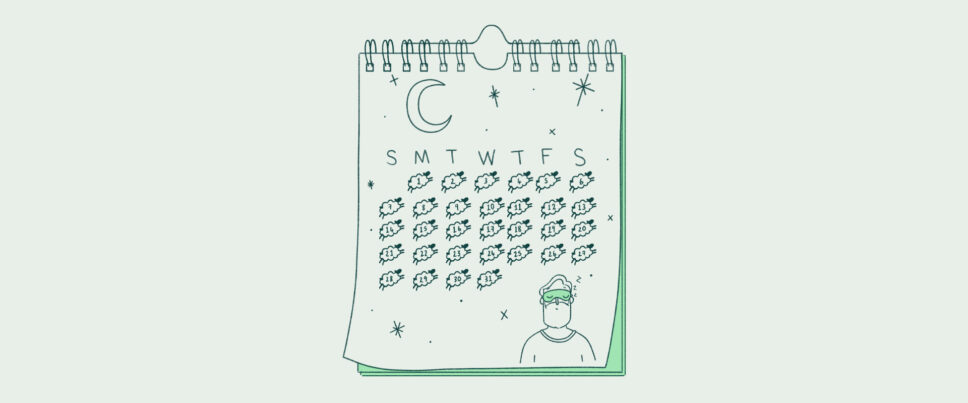
Sleep and its regenerative powers have slowly been making their way into our collective consciousness. Sleep apps, trackers and soft alarms are becoming the next wellness obsession. So how important is sleep, how does it affect your weight, and how can we get enough of it?
Why is sleep important to weight loss?
A number of studies have shown a link between a lack of sleep and weight gain. When we don’t sleep well we tend to feel hungrier because our bodies produce higher levels of ghrelin (a hunger hormone) and lower levels of leptin (a satiety hormone which reduces appetite). Sleep deprivation also interferes with our insulin response which means it takes longer to feel full when eating, and therefore we eat more.
What’s the science behind sleep?
Hormonal fluctuations, driven by our circadian rhythm and sleep pressure, make us fall asleep each day.
Our circadian rhythm – the body’s natural sleep-wake cycle – is influenced by light and darkness. Darkness at night sends a signal to your brain, triggering an increase in melatonin production to encourage us to sleep.
Sleep pressure – our natural urge to sleep – builds throughout the day from the moment we wake up. It decreases when we sleep, reaching a low point after a full night of sleep.
Sleep is vitally important because it helps us manage our emotions, cope with stress, repair physical injuries, reboot our immune system, and reset our hormones so that we can function effectively every day.
So what causes us to sleep poorly?
There are many lifestyle factors that can consistently disrupt our sleep quality, including:
- Caffeine
- Jet lag
- Stress
- Reduced activity or exercise levels
- Unstable blood glucose levels
- Alcohol
- Underexposure to natural light
- Overstimulation (from phones, TVs, noise, conversation) before bedtime
We all have different sleep requirements
What constitutes a good night’s sleep varies hugely from person to person. We all need different amounts of sleep, and have our own sleep-wake cycles and sleep schedules that work best for our bodies.
Your chronotype describes the sleep-wake cycle your body naturally prefers. It’s influenced by three main things: genes, age and development, and light exposure. People with an ‘early chronotype’ are morning larks – they feel much more productive when they get up early, and go to bed early. ‘Late chronotypes’ are night owls – they naturally wake up later, go to sleep later, and are often most productive later in the day. Knowing what your chronotype is can really help you to optimise both your sleep schedule and your daytime performance.
Take action ⚡
Ask yourself whether you feel you’re getting enough sleep for you. These questions might help you decide:
Do you feel you’re able to function optimally throughout the day?
Do you need an alarm clock to wake you every morning?
Do you oversleep extensively on weekends or holidays without your day-to-day routine?
Are you often irritable?
Do you need a nap during the day?
Do you rely on caffeinated drinks to give you enough energy throughout the day?
If you answered “Yes” to most of these questions, you’re probably not getting enough sleep.
Over the next couple of articles we’ll show you how to supercharge your sleep by making changes to your day-to-day and bedtime routines.
Mesarwi O., Polak J., Jun J., Polotsky V.Y. Sleep Disorders and the Development of Insulin Resistance and Obesity. Endocrinol. Metab. Clin. N. Am.
Patel S.R., Hu F.B. Short Sleep Duration and Weight Gain: A Systematic Review. Obesity.
Zhu G., Cassidy S., Hiden H., Woodman S., Trenell M., Gunn D.A., Catt M., Birch-Machin M., Anderson K.N. Exploration of Sleep as a Specific Risk Factor for Poor Metabolic and Mental Health: A UK Biobank Study of 84,404 Participants. Nat. Sci. Sleep.
Rihm J.S., Menz M.M., Schultz H., Bruder L., Schillbach L., Schmid S.M., Peters J. Sleep Deprivation Selectively Upregulates an Amygdala–Hypothalamic Circuit Involved in Food Reward. J. Neurosci.
Sargent C., Zhou X., Matthews R.W., Darwent D., Roach G.D. Daily Rhythms of Hunger and Satiety in Healthy Men during One Week of Sleep Restriction and Circadian Misalignment. Int. J. Environ. Res. Public Health.
Nedeltcheva A.V., Kilkus J.M., Imperial J., Kasza K., Schoeller D.A., Penev P.D. Sleep Curtailment Is Accompanied by Increased Intake of Calories from Snacks. Am. J. Clin. Nutr.
Imaki M., Hatanaka Y., Ogawa Y., Yoshida Y., Tanada S. An Epidemiological Study on Relationship between the Hours of Sleep and Life Style Factors in Japanese Factory Workers. J. Physiol. Anthropol. Appl. Hum. Sci.
Kim TW, Jeong JH, Hong SC. The impact of sleep and circadian disturbance on hormones and metabolism. Int J Endocrinol. 2015;2015:591729. doi: 10.1155/2015/591729. Epub 2015 Mar 11. PMID: 25861266; PMCID: PMC4377487.
Feingold CL, Smiley A. Healthy Sleep Every Day Keeps the Doctor Away. Int J Environ Res Public Health. 2022 Aug 29;19(17):10740. doi: 10.3390/ijerph191710740. PMID: 36078455; PMCID: PMC9518120.
Duffy JF, Wright KP Jr. Entrainment of the human circadian system by light. J Biol Rhythms. 2005 Aug;20(4):326-38. doi: 10.1177/0748730405277983. PMID: 16077152.
While we've ensured that everything you read on the Health Centre is medically reviewed and approved, information presented here is not intended to be a substitute for professional medical advice, diagnosis, or treatment. It should never be relied upon for specific medical advice. If you have any questions or concerns, please talk to your doctor.




